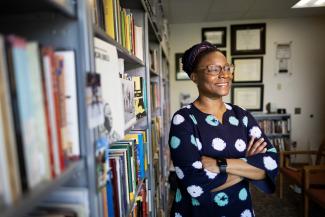
Keisha-Khan Y. Perry is the Presidential Penn Compact Associate Professor in Africana Studies. As an anthropologist of Black social movements in the Americas, she has degrees from Georgetown University and the University of Texas at Austin; she was an Andrew W. Mellon postdoctoral fellow and has had professional appointments at Brown and Princeton.
But despite this establishment pedigree, Perry is, at her core, a radical and a truth-teller. “I get paid in integrity, academic integrity,” she says. “That’s my cachet.”
Established as a department at Penn in July 2012 after 40 years of Black studies, Africana Studies is an interdisciplinary and cross-regional approach to the history, sociology, anthropology, and literature of Black lives across the diaspora.
Perry adds another component to this department. Her work is comparative and transnational, adding to an existing strength in Africana studies of scholars who focus on Black women’s scholarship, says Michael G. Hanchard, the Gustave C. Kuemmerle Professor of Africana Studies.
While Perry conducts most of her research in Brazil, Portuguese is actually her fourth language. Originally from Jamaica, Perry grew up bilingual in Jamaican Patois and English. She migrated to New Jersey at age 10, accompanying her mother, an environmental activist. Her mother went to community college, Rutgers-New Brunswick, and then to Rutgers Law School, where she continued her work in environmental activism and prisoners’ rights, while Perry went to Science Park High School in Newark.
The experience shaped her intellectual journey, Perry says. “It was the first place that I had Black teachers, that I had people assign Black scholars, films like “Eyes on the Prize,” a 14-episode documentary of the Civil Rights Movement, she says. Beyond church, Science Park High “was my first introduction to Black life in the United States and learning about Black history in a very critical way,” she says.
Her life during this time was “a series of what seemed like serendipitous moments,” Perry says. While waiting around in the library, a librarian handed her a book with information about going abroad. Perry applied for and won a scholarship to go to Spain the summer after her 10th grade year, where she stayed with a host family and perfected Spanish, her third language.
She talks with students about how chance and conversation can open doors. “If people don’t really talk to each other, know how to talk to strangers, know how to interact, are in the right places at the right time, they don’t catch these opportunities because they’re missing the opportunity to connect,” Perry says.
Later, while at Georgetown, planning to be diplomat, Perry met a historian who encouraged her to go to Brazil, again changing the trajectory of her life and work.
In Brazil, she began working with a local women’s organization in Gamboa de Baixo, “It’s a small coastal community in the center of Salvador that has been fighting for land and housing rights since the early 1990s,” she says. “And I kind of joined that struggle in solidarity and to offer my support.”
This meant photographing protests to writing memos to making food, while simultaneously doing an ethnographic study of the women’s activist work, documenting their participation and leadership and the way racial and gender identity played out in urban spaces.
The result, “Black Women Against the Land Grab: The Fight for Racial Justice in Brazil,” was reviewed in more than 20 publications and won the National Women’s Studies Association Gloria E. Anzaldúa Book Award in 2014.
Perry worked on a translation of this work into Portuguese, which was published in September 2022. “I always felt that it was so important to have my book available in Portuguese so that activists and scholars in Brazil could read my book,” she says.
“It took a very long time to get that done. I don’t think people understand the emotional and physical and mental labor that it takes to translate a book and publish it. Even with the support of translators, you still have to go back through and read it carefully as well as update it for a Brazilian audience,” Perry says, noting that she considers the work her biggest academic accomplishment to date.
“Keisha’s ethnographic and anthropological focus is on Black and brown women’s mobilization from spaces of social, economic and political marginalization, independent of formal political parties, trade unions and elite feminist organizations,” Hanchard says. “What’s unique is that she has focused on people who created their own independent institutions. They were not necessarily tethered to political parties, trade unions, and elite feminist organizations but instead were organized around discrimination, housing, and gentrification.”
